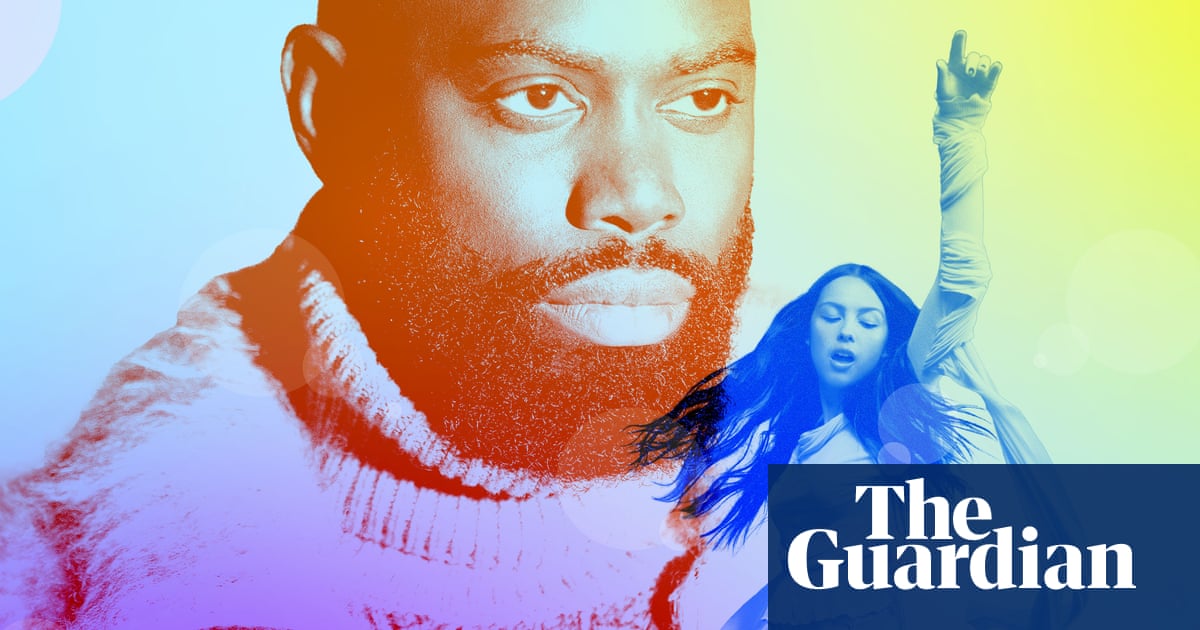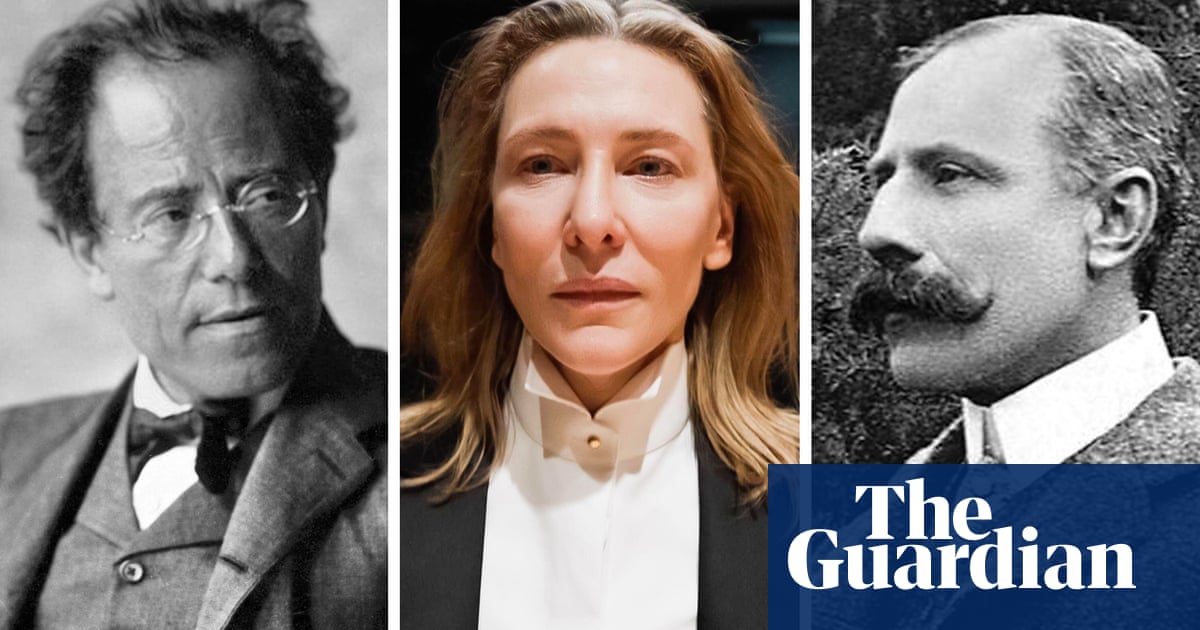
Sleaford Mods – Spare Ribs
The title of Sleaford Mods’ sixth album is apparently an oblique reference to the fatalities in the first wave of coronavirus: “Human lives are always expendable to the elites,” in the words of vocalist Jason Williamson, “we’re in a constant state of being spare ribs.” The presence of a track called Shortcummings suggest events of the last 12 months figure heavily, although lead single Mork n Mindy offered a grim look back at 80s childhood.
• Released on 15 January
Bicep – Isles
Belfast duo Bicep’s eponymous 2017 debut was an impressively eclectic gem that shifted them away from their deep house roots into breakbeats, electro and drum’n’bass: in scope and ambition, it recalled the blockbusting dance albums of the 90s by Orbital or Leftfield. And Saku, one of three singles already taken from its follow-up, was one of 2020’s low-key delights: a dreamy collaboration with singer-songwriter Clara La San that stirred influences from IDM, footwork and 90s R&B into their sound.
• 22 January
Arlo Parks – Collapsed in Sunbeams
The first time the Guardian featured Arlo Parks, it suggested her music was “emo 2.0”, a neat label to give her brand of confessional lyrics (the feature came on the heels of an EP called Super Sad Generation, a title that wasn’t meant knowingly) and stark, intimate delivery. The string of singles she’s released over the past two years have been fabulous – there’s a keen pop sensibility lurking amid the acoustic guitar and breakbeat-led angst.
Foo Fighters – Medicine at Midnight
Recorded in a reportedly haunted house in California, Medicine at Midnight was completed in February last year, but delayed by the onset of Covid-19. Frontman Dave Grohl has variously described it as “a party album”, “different to anything we’ve ever done” – single Shame Shame’s clattering drums and pizzicato strings certainly sounded unlike previous Foo Fighters tracks – and featuring “choruses that 50-fucking-thousand people are going to sing”.
• 5 February
Slowthai – Tyron
The couple of years since the release of Slowthai’s punkily fantastic debut Nothing Great About Britain have been turbulent ones for the rapper: critical acclaim and commercial success mixed with controversy over both his performance at the Mercury prize holding an effigy of Boris Johnson’s severed head and his behaviour at the subsequent NME awards. Tyron apparently offers more introspection – James Blake makes a guest appearance – amid the noisy punk/grime aggro.
• 5 February
Daniel Avery – Together in Static
Avery had a packed 2020: an experimental ambient drone album in collaboration with Nine Inch Nails instrumentalist Alessandro Cortini; his third solo album, the acclaimed Love + Light; and Lone Swordsman, his gorgeous tribute to the late Andrew Weatherall. Together in Static – the name of a beatless track Avery premiered during a recent Radio 1 mix – features more new music, premiered at a seated, socially-distanced concert at London’s Hackney Church on 13 February, followed by an album “a matter of weeks later”.
Jane Weaver – Flock
Weaver was once a performer of folk bent, but since 2014’s superb Hawkwind-sampling breakthrough album The Silver Globe, she’s pursued an ambitious, idiosyncratic modern take on psychedelia: last year she was both sampled by Coldplay and tapped to remix Paul Weller. Flock is apparently more pop-focused than its predecessors, and also influenced by Lebanese and Russian music. As single The Revolution of Super Visions makes clear, Weaver’s version of pop is distinctly cosmic and deliciously skewed.
Richard Thompson – Beeswing: Fairport, Folk Rock and Finding My Voice 1967-75
Richard Thompson’s autobiography – or perhaps his first volume of autobiography, given that it cuts off 45 years ago – covers the most tumultuous years of the legendary guitarist and songwriter’s career: the invention of British folk rock with Fairport Convention, his friendships with Jimi Hendrix, Sandy Denny and Nick Drake among others, his partnership with ex-wife Linda and a conversion to Sufi Islam that led him to give up worldly goods, move into a commune and temporarily retire from music.
• Published on 15 April
Tracey Thorn – My Rock’n’Roll Friend
Thorn’s books to date – the autobiographical Bedsit Disco Queen and Another Planet: A Teenager in Suburbia, and the wide-ranging examination of what it is to be a singer, Naked at the Albert Hall – have been uniformly fantastic. My Rock’n’Roll Friend, which documents her intriguing 37-year relationship with Lindy Morrison, drummer in 80s Australian critical darlings The Go-Betweens – a band whose bookish public image concealed a noticeably tougher, earthier reality – promises equally great things.
• 1 April
Cardi B
Anticipation has understandably been high for the rapper’s second album – as yet untitled – which seems guaranteed to be an event: its Grammy-nominated, multiplatinum predecessor, Invasion of Privacy, was the longest-charting album by a female rapper in US history; record-breaking single WAP was, by common consent, the biggest track of summer 2020. And furthermore, she’s been teasing it for the best part of a year: describing its contents as “really different” and containing moments that compare to Beyoncé’s Lemonade.
Travis Scott – Utopia
Travis Scott has confirmed the title of his follow-up to 2018’s distinctly psychedelic-hued Astroworld – a vast critical and commercial success – and that it’s set to be released at some point in early 2021. The two singles that heralded it – Highest in the Room and Franchise, the latter a collaboration with Young Thug and MIA, who Scott described as “the illest of all time” – both went to the top of the US charts, suggesting the album itself is bound to be huge.
• Release date TBC
Stevie Wonder – Through the Eyes of Wonder
To say Stevie Wonder’s new album is eagerly anticipated counts as a vast understatement: he last released an album in 2005, and first mooted the idea of a follow-up seven years ago. Moreover, the two tracks he released in 2020, Can’t Put It in the Hands of Fate and Where Is Our Love Song? saw a Black Lives Matter-inspired return to the righteous political ire of peak-period tracks You Haven’t Done Nothin’ or Frontline and an intriguingly broad choice of collaborators: from rapper Busta Rhymes to blues-soul guitarist Gary Clark Jr.
• Release date TBC
Classical and opera
London Symphony Orchestra
The LSO is planning weekly concerts at its Barbican home (with each programme played twice on the same day) and at LSO St Luke’s up to the end of March at least, hopefully with live audiences. Simon Rattle conducts eight of them, including the opening programme, which pairs Berg’s Violin Concerto with Schubert’s Ninth Symphony, and the last, in which soprano Barbara Hannigan sings Barber and Varèse. There’s also the premiere of Francisco Coll’s Violin Concerto, with Patricia Kopatchinskaja as the soloist, conducted by François-Xavier Roth.
• Barbican and LSO St Luke’s, London, 7 January-21 March
Hallé Orchestra
The Hallé’s winter programme continues with seven concerts streamed from Bridgewater Hall and Hallé St Peter’s. Music director Mark Elder conducts three, including a staged performance of Stravinsky’s The Soldier’s Tale, directed by Annabel Arden, and another will be directed by the violinist Henning Kraggerud, the orchestra’s current artist-in-association; the series ends with the world premiere of Huw Watkins’s second symphony.
Wigmore Hall
The Wigmore Hall extends its programme into the new year, with live audiences where possible, and all concerts streamed live on the hall’s website. There are recitals planned by Lise Davidsen, Christian Gerhaher, Igor Levit, Garrick Ohlsson and the Hagen Quartet, and there’s also a day devoted to the music of Morton Feldman, played by members of Apartment House.
• Wigmore Hall, London, ticketed live audiences where permitted and streamed live
Bournemouth Symphony Orchestra
Kirill Karabits conducts six of the Bournemouth orchestra’s 12 concerts in the coming months; they include the UK premiere of Mason Bates’s Auditorium and Chary Nurymov’s Symphony No 2 (in a programme that includes another rarity - Rimsky-Korsakov’s Antar Symphony). Pianist Benjamin Grosvenor is artist-in-residence, and guest conductors include John Eliot Gardiner, Mark Wigglesworth and Marta Gardolińska.
• Lighthouse, Poole, 6 January-24 March, ticketed live audiences where permitted; streamed live and available on demand for 30 days afterwards (£)
Glyndebourne Opera
Though performance dates have still to be finalised, Glyndebourne has announced a full summer season with six productions. Three of them are brand new – Damiano Michielleto stages Janáček’s Kát’a Kabanová, Mariame Clément returns with Rossini’s Il Turco in Italia, and Christof Loy brings Verdi’s Luisa Miller to Sussex for the first time – and there are revivals of Mozart’s Die Zauberflöte and Cosi fan Tutte, and Wagner’s Tristan und Isolde.
Tosca, Royal Opera House
Tiers-permitting, the Royal Opera hopes to open in mid-January a revival of Jonathan Kent’s 2006 production of Puccini’s Tosca, in what would be the first fully staged opera production at Covent Garden since last March. The revival has three casts, the first headed by Anna Netrebko, singing the title role at the ROH for the first time, with Yusif Eyvazov as Cavaradossi and Gerald Finley as Scarpia; Saioa Hernández and Malin Byström lead the other lineups.
• Royal Opera House. London, 13-23 January and 4-13 March
Royal Liverpool Philharmonic
The RLPO contributes five streamed concerts to the new year’s programme at Philharmonic Hall, which begins with Andrew Manze conducting with Dag Wirén, Nielsen and Beethoven. Chief conductor Vasily Petrenko’s contributions include Tchaikovsky’s Mozartiana Suite and Schreker’s The Birthday of the Infanta, violistLawrence Power directs the orchestra in Berio, Woolrich and Tippett, and there’s a two-concert celebration of Astor Piazzolla.
Live from the Barbican
As well as hosting most of the LSO’s concerts, the Barbican is running a concert series of its own up to Easter, with a mix of genres, from baroque to jazz and folk. It begins with a recital by Benjamin Grosvenor of Chopin, Ravel, Liszt and Ginastera, and ends on Good Friday with The Sixteen and Britten Sinfonia in a programme that includes James MacMillan’s Stabat Mater.
• Barbican, London, 10 January to 2 April, ticketed live performances when permitted and streamed live (£)
Garsington Opera
Four productions make up the Garsington six-week season in its purpose-built pavilion high in the Chilterns. There’s a revival of Michael Boyd’s 2016 staging of Tchaikovsky’s Eugene Onegin, while the other three shows are brand new – Bruno Ravella directs Strauss’s Der Rosenkavalier, Netia Jones directs and designs Handel’s Amadigi, and Cal McCrystal takes charge of Rossini’s Le Comte Ory.
• Wormsley Place, Stokenchurch, 3 June to 25 July
Longborough festival opera
To accommodate a larger socially distanced audience next summer, Longborough is presenting three of its new productions – Mozart’s Così fan Tutte, Monteverdi’s The Return of Ulysses and Janáček’s Cunning Little Vixen – in a specially designed Big Top. A concert staging of Wagner’s Die Walküre will be performed in Longborough’s familiar opera house, with extra performances are scheduled to ensure as many as possible can see it.












